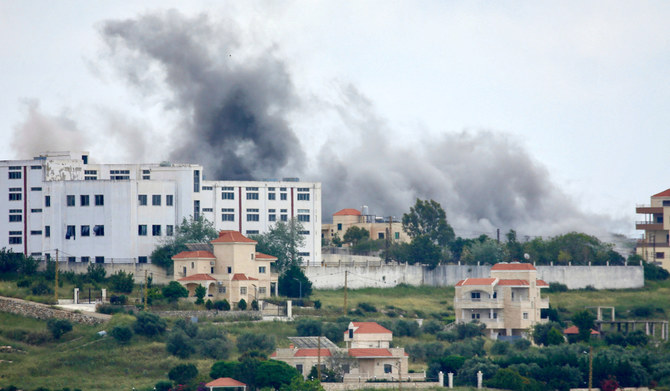BEIRUT: Discussions continued on Saturday about a French proposal designed to ease tensions and halt clashes between the Israeli army and Hezbollah along Lebanon’s southern border.
Lebanese officials received an amended version of the proposal on Friday, which summarized meetings held by Stephane Sejourne, France’s foreign minister, in Lebanon and Israel.
The proposal also aims to ensure the full implementation of UN Security Council Resolution 1701, which was adopted in 2006 with the aim of resolving the war that year between Israel and Hezbollah.
One political observer said Lebanese officials had prepared a response to the French document and were awaiting Israel’s response.
On Friday and Saturday there was a noticeable decline, generally, in hostilities between the two sides in southern Lebanon, though there were exceptions. One of them was the targeting of the “Israeli Meron Airbase in the Safed area on Friday from Lebanese territories,” Israeli authorities said. Hezbollah did not immediately claim responsibility for the attack. However, the group did say it shelled the Israeli site of Bayad Blida at dawn on Saturday while Israeli soldiers were there.
Meanwhile, the Israeli army opened fire in the vicinity of a shepherd in Wazzani but he was unharmed. Israeli artillery targeted Aita Al-Shaab, Jabal Blat and the outskirts of the towns of Naqoura and Alma Al-Shaab.
Extreme caution seemed to prevail in many border areas as Israeli reconnaissance warplanes continued to operate over Hasbaya and the occupied Shebaa Farms, reaching Western Bekaa and Iqlim Al-Tuffah.
In addition to the diplomatic processes related to the French peace plan, Lebanese authorities were also awaiting the outcome of negotiations in Cairo for a possible agreement between Israel and Hamas on a ceasefire in Gaza. Hezbollah previously linked any end to hostilities in southern Lebanon along the border with Israel to a ceasefire in the Gaza Strip.
Channel 12 news in Israel reported on Saturday that the security establishment in Tel Aviv believed Israeli authorities were close to an agreement with Hezbollah and Lebanon, similar to the provisions of UN Resolution 1701. It said the Israeli security establishment was working with US officials on the process, including American envoy Amos Hochstein, who oversaw indirect negotiations between Lebanon and Israel to demarcate their maritime borders in 2022.
Regarding the French peace plan, Nabih Berri, the speaker of the Lebanese Parliament, said he had received a copy of the document from the French Embassy in Lebanon and will respond.
“It included acceptable points and others that are unacceptable and must be amended, subject to discussion and review,” he added.
The revised proposal refers to a previous ceasefire agreement signed by Israel and Lebanon on April 26, 1996. It also highlights the steps that can be “taken to stop the escalation and ensure the effective implementation of UN Resolution 1701.”
Media leaks suggested its recommendations included “creating a monitoring group with the US, France, Lebanon and Israel. This group would oversee implementation and address any complaints from the involved parties in stages.”
The first stage would require Lebanese armed groups to halt their military operations inside Israel and disputed border regions, refrain from attacking personnel or facilities belonging to the UN Interim Force in Lebanon, and guarantee unrestricted freedom of movement for UNIFIL forces, including patrols in all areas south of the Litani River.
It calls on Israel to “halt military operations inside Lebanon, including airstrikes on Lebanese territory, refrain from any actions that may put UNIFIL personnel or facilities at risk, and ensure UNIFIL’s freedom of movement, including stopping the locking of aircraft radars on UNIFIL naval forces ships.”
Regarding UNIFIL’s mission in the first phase, the French initiative said the force will be “monitoring the cessation of hostilities on the ground and increasing the number of patrols and redeployments along the Blue Line to ensure effective respect for the cessation of hostilities and subsequent commitments by the parties.”
The Blue Line is a demarcation line dividing Lebanon from Israel that was set by the UN in June 2000 to determine whether Israeli forces had fully withdrawn from Lebanon.
The second phase of the French initiative, to be implemented within three days, would involve “dismantling all installations, facilities and centers near the Blue Line, including containers, small towers and tents, and the withdrawal of combat forces, including the Radwan militia, and military capabilities, including shooting capabilities in depth and anti-tank systems, for a distance of not less than 10 kilometers north of the Blue Line.”
It would also require Israel to “stop flying over Lebanese airspace.” It urges Lebanon to resume meetings of the tripartite mechanism, involving UNIFIL and the Israeli and Lebanese militaries, and deploy about 15,000 Lebanese soldiers along the Blue Line south of the Litani River, with UNIFIL and other international partners supporting this deployment.
During a 10-day third phase, Lebanon and Israel, with UNIFIL support, would be expected to resume talks about their land borders. These are intended build on negotiations that took place in 2017, and focus on areas already discussed in 2018 within the framework of the UNIFIL tripartite mechanism, with the aim of establishing an area between the Blue Line and the Litani River free of armed groups and weapons other than those related to the Lebanese government and UNIFIL.
These talks would take place in parallel with international efforts in the form of a support group to assist in the deployment of Lebanese forces in the southern region, and the social and economic development of the region.























